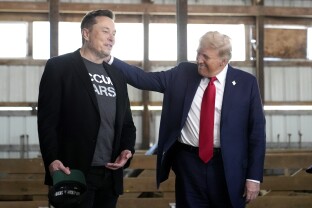Starting next week, Elon Musk and his team could have an even clearer path to gaining widespread access to government systems.
The Office of Personnel Management issued a recommendation last week to agency heads to reclassify the jobs of top IT officials to allow for the posts to be filled by political appointees. Agencies have until Friday to report whether they will do so.
Chief information officers can determine the extent of access a White House branch like the U.S. DOGE Service — formerly known as the U.S. Digital Service — has to agencies’ technical systems. Many CIO positions are currently restricted to career civil servants. Changing the job classifications could mean Musk has more politically aligned tech staff at his disposal just as his role expands to having “policy-determining capabilities.”
“At the most basic level, it is very clearly about giving a morally legitimate and easier pathway for people more directly aligned to DOGE and to Donald Trump to come in,” one former White House official who worked on tech issues for multiple administrations, told NOTUS.
Democrats have also previously advocated for agency CIOs to be more directly aligned with a presidents’ agenda. But giving Musk wider access to technical systems is raising alarm bells for some critics now, as DOGE moves far beyond the narrow mandate of “software modernization” and becomes a tool for stopping payments or dismantling agencies.
“They are correct that career SES CIOs are a problem,” United States Digital Service’s first administrator under President Barack Obama, Mikey Dickerson, texted NOTUS. “I would have wanted to do this for the purpose of making the agencies function better, and their purpose appears to be the opposite, but the action could have been the same.”
Some agencies like the Department of Defense and Veterans Affairs already have political appointees running the IT operations, and there has been a long-standing debate about shifting more of the positions. OPM’s less-noticed recommendation last week cemented the Trump administration’s view that a CIO’s job is a political one.
“No longer the station of impartial and apolitical technocrats,” OPM wrote last week. “The modern agency CIO role demands policy-making and policy-determining capabilities across a range of controversial political topics.”
Trump has already made some political appointments to CIO positions, including at least three from Silicon Valley. The new Department of Energy CIO appears to be a former SpaceX employee, one of Musk’s companies, as first reported by E&E News.
OPM declined to provide NOTUS data about how many agencies have moved to reclassify their CIO positions thus far, as the deadline is Friday.
Federal workforce advocates say agencies should weigh the long-term trade-off of putting politically focused executives in charge of government IT systems that are notoriously outdated and can take years to modernize.
Most IT projects “are multiyear projects,” Partnership for Public Service’s Vice President of Government Affairs Jenny Mattingley told NOTUS. “Having somebody who’s there for a longer term, that can take a more strategic approach to how they’re working on all of these systems and the IT needs for the agency is one of the reasons why having career folks in place is helpful.”
Whether agencies pay heed to OPM’s request and open the door for political allies to take charge of IT or keep those jobs reserved for career bureaucrats, Trump has already fired executive-level civil servants at will — though those moves are currently being litigated in court.
“As people are thinking about, ‘Well, what does it mean if they’re career or whatever,’ the president already said he can fire these people however and whenever for no reason and without regard to the Civil Service Reform Act,” Jason Briefel, director of policy and outreach at the Senior Executives Association, told NOTUS.
There is already some flexibility in reassigning career executives, Briefel said, meaning CIOs could be, essentially, removed from their posts regardless of whether agency heads reclassify them under this memo.
But the change would make it easier to replace tech leaders with politically aligned allies. And OPM’s recommended change makes one goal clear: “Software modernization” is a means to Trump’s ends.
“A modern agency CIO is not a mere engineer, scientist or technocrat,” OPM wrote. “He does not spend his days writing complex lines of code, setting up secure networks or performing other ‘highly technical’ tasks. Instead, he crafts and effectuates policy, and sets and deploys his budget, based on his administration’s priorities.”
—
Claire Heddles is a NOTUS reporter and an Allbritton Journalism Institute fellow.
Sign in
Log into your free account with your email. Don’t have one?
Check your email for a one-time code.
We sent a 4-digit code to . Enter the pin to confirm your account.
New code will be available in 1:00
Let’s try this again.
We encountered an error with the passcode sent to . Please reenter your email.


